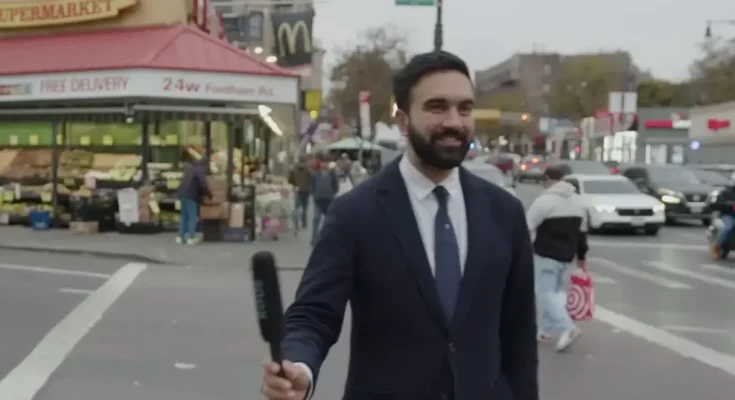Parents across New York began making contingency plans to pull their children from city schools within minutes of Zohran Mamdani being projected the winner of the mayoral race, according to an education consultant who says he saw a sudden rush of requests for placements outside the five boroughs. Christopher Rim, founder and chief executive of the consultancy Command Education, told the New York Post he was contacted immediately after major outlets called the election for Mamdani. “Within the first 30 minutes of AP announcing Mamdani’s victory, I got three messages from families looking to move,” Rim said, adding that the inquiries have since grown as parents ask for urgent help finding places in competitive private schools in New Jersey, Connecticut and Florida.
Rim said several of his clients had anticipated the result and acted before Election Day, moving from New York City to nearby suburbs to position their children for alternative school options if the political landscape shifted. “Over the summer, I started hearing families say, ‘I don’t know what we are going to do if this guy wins,’” he said. The Post reported that six of Rim’s clients moved ahead of the school year to Greenwich, Darien and Riverside in Connecticut, while others began compiling target lists of out-of-state schools with space and strong reputations.
The consultant described a scramble for seats at highly selective institutions, cautioning that even students from New York’s most prestigious schools would face stiff competition to enrol on short notice. He warned families that last-minute transfers require “a very strong application” with recommendation letters and supporting materials that are not always easy to assemble quickly. He contrasted the admissions calculus parents had grown accustomed to in New York with the difficulty of breaking into top schools in Florida at speed, noting, in comments cited by the Post, that entry to those campuses could be “far, far, far more difficult.”
Rim also told the paper that the political result had triggered rapid adjustments to older students’ plans, including removing New York-based universities from application lists. On Wednesday morning, he said, he spoke with a family who decided to take NYU and Columbia off their list “because they don’t want their kid to live in New York City” with Mamdani as mayor. In his assessment, many of the families signalling an exit had already been weighing a move; the election outcome served as the “final thing that pushed them” to seek options in New Jersey, Connecticut, Florida or further afield.
Beyond individual consultations, a high-profile communal response emerged within hours of the race being called. Rabbi Marc Schneier, founding rabbi of The Hampton Synagogue in Westhampton Beach, announced that he plans to establish what he called “the first Jewish day school in the Hamptons,” saying the initiative is “in anticipation of the thousands of Jewish families that will flock to the Hamptons and greater Suffolk County to escape the antisemitic climate of Mamdani’s New York City.” His statement was posted publicly on X shortly after projections showed Mamdani had won; multiple outlets carried Schneier’s comments on Wednesday morning.
Schneier’s announcement reflected anxieties voiced during the campaign by some Jewish organisations. The Anti-Defamation League’s chief executive, Jonathan Greenblatt, said after the result that the group would “approach the next four years with resolve” in view of what he called Mamdani’s “long, disturbing record on issues of deep concern to the Jewish community.” Greenblatt added: “We will neither compromise nor relent in our pursuit of our core purpose, to protect the Jewish people.” His remarks were reported alongside Schneier’s plans as stakeholders weighed the implications of a transition at City Hall.
The school-choice rush described by Rim sits against a wider backdrop of parents rethinking education, cost of living and safety in New York. Prior to Election Day, a J.L. Partners survey suggested large numbers of residents were considering leaving the city if Mamdani won, with 9% saying they would “definitely” leave and another 25% saying they would consider a move. Coverage of the poll noted that such an outflow, if realised, would represent hundreds of thousands of people; the pollster’s breakdown indicated elevated intent among older voters and Staten Islanders and highlighted potential destinations in lower-tax states.
The appetite for relocation has also been visible in school-system data and family surveys unrelated to election day dynamics. In research highlighted by Chalkbeat this year, city education officials reported that families who left New York frequently cited a “better environment to raise kids,” “concerns about schools,” more space, crime concerns and affordability among the top reasons for moving. The reporting chronicled individual cases of parents transferring children to suburban districts for perceived improvements in school support services and logistics such as before- and after-care.
Mamdani’s education agenda was a persistent flashpoint during the campaign. Reporting in October detailed his plan to phase out the city’s Gifted & Talented programme at the kindergarten level, with a shift toward a universal early-education model and delayed identification of gifted pupils. Supporters framed the proposal as an equity measure to reduce sorting of children at very young ages; critics argued it would eliminate vital opportunities for advanced learners and add pressure to an already strained public-school system. The debate over G&T policy has been a bellwether for broader disagreements about admissions, merit and equity in the nation’s largest school district.
The policy backdrop and the election result combined to create immediate, practical questions for families weighing next steps. Rim said many of his clients were asking about specific campuses in Florida, including American Heritage in Plantation, Pine Crest in Fort Lauderdale and Boca Raton, Ransom Everglades in Miami and Miami Country Day School, along with Jewish day schools such as Lehrman Day School in Miami Beach. Others were exploring options in New Jersey, including Saddle River Day School and Dwight-Englewood, and in Connecticut, including Greenwich Country Day School. The consultant repeatedly cautioned, as reported by the Post, that late applicants should prepare for rejections or wait-lists even with strong academic records.
The business community’s unease with the incoming administration formed another layer of the post-election reaction. Days before the vote, Reuters reported that Wall Street leaders were bracing for a potential Mamdani victory and assessing how to maintain working channels with City Hall while expressing concerns about tax and housing proposals. The piece described early contact between Mamdani and influential executives as well as stepped-up political spending by financiers who opposed his platform. Those jitters mapped onto the poll findings about potential departures and fed into parents’ calculations about where they want their children to study and, in some cases, where they want to live.
For parents already navigating the competitive New York education landscape, the practicalities loom large. Private-school admissions typically follow annual cycles with assessments, interviews and deadlines that have already passed for the current school year. Rim said that even families with connections must present comprehensive, polished applications to have a chance of mid-year entry elsewhere, a process that involves transcripts, teacher recommendations and testing that can take weeks to gather. The constraints are sharper for families seeking high-performing schools in destinations that have themselves become magnets, particularly in South Florida.
Not every family considering a change is motivated solely by politics. As education reporters have noted, the city saw multi-year enrollment declines driven by pandemic disruption, housing costs and shifting work patterns, with some families relocating for space and predictability rather than ideology. The Chalkbeat survey found that among families who left public schools, half listed “concerns about schools” among their top reasons, and nearly two-thirds said they were seeking a better environment to raise their children. The election outcome may accelerate decisions already in motion, pushing some who were on the fence to act sooner.
Still, the immediate post-election comments from Rim and Schneier point to a distinct surge linked in time to Tuesday night’s call. Families who had been tracking the campaign now face a calendar reality: fall terms are well underway, and second-semester intakes at independent schools—where they exist—offer limited seats. Several of the Florida and tri-state campuses mentioned have selective acceptance rates and draw national applicant pools. That arithmetic, Rim said, could leave some late-moving New Yorkers disappointed, whatever their motivations.
The potential movement of families also intersects with university-level choices. Rim described parents trimming New York universities from application lists in reaction to the new political climate, a continuation of concerns he has voiced in other media about campus safety and protest turmoil affecting student and parent decision-making nationally. The practical implication, he said, is that teenagers may recalibrate ambitions toward campuses perceived as calmer or further from protest flashpoints, while parents who can work remotely explore relocations to school districts that they believe offer more stability.
The scope of any exodus will depend on how many of the intentions recorded in polling translate into moves. Surveys before the election—commissioned by media outlets and summarised across several platforms—captured striking levels of uncertainty about the city’s direction under a Mamdani administration. Pollster James Johnson of J.L. Partners said older New Yorkers, Staten Islanders and white voters were among the most likely to say they would leave if Mamdani won, warning that even a fraction of the stated intent would have “seismic” economic implications. Those figures, while not predictions, help explain the urgency reflected in the calls Rim described and the pre-emptive steps some families took over the summer.
For now, the lived reality is that a segment of New York parents—many with children at elite institutions in the city—are seeking alternatives beyond its limits, citing safety, climate around antisemitism and education policy as drivers. The incoming administration will face early tests in calming those fears while advancing its agenda on equity and access, including any changes to programmes such as Gifted & Talented. As Schneier’s public pledge to build a day school in the Hamptons illustrates, the reverberations from Tuesday night have already moved from rhetoric to concrete plans. Whether that foreshadows a sustained shift of school-age families out of New York will become clearer in admissions cycles to come.
Mamdani’s victory itself—projected after a bitter campaign and an upset primary season—remains the central fact reframing decisions in homes across the city. In the coming weeks, his transition team is expected to outline education appointments and first-hundred-days priorities. Community leaders, school administrators and parent groups are likely to press for clarity on admissions, programme continuity and safety measures as they make their own choices. For parents on the phone to consultants and scanning school websites in neighbouring states, the clock is already running.



